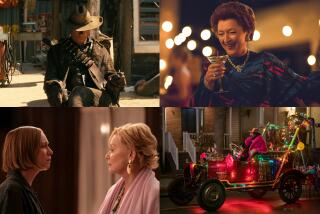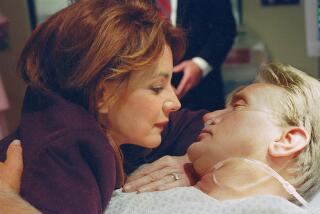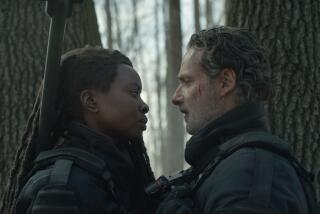‘The Walking Dead’ recap: Going home
- Share via
“Clear” isn’t just a good episode of “The Walking Dead.” It’s a good episode of television.
That isn’t always the case. Even the best episodes of this show can be let down by boneheaded character moments or bits of the plot that don’t make a lot of sense. The series has always struggled with characters who are, even at their best, broadly drawn. To find an episode of the show this good, you almost have to go all the way back to the pilot, which was stark and cinematic and silent and so not what the show became once it had to settle into the weekly drudgery of having the characters move from zombie attack to zombie attack. That pilot bought the show a lot of good will that it could become as good as some of TV’s best shows, but for the most part, the series has been content to be enormously entertaining at its best, cripplingly boring at its worst, and never particularly deep.
That’s OK, of course. Not every show on TV has to have the character depth of “Mad Men” or the complicated plotting of “Justified.” There’s room for shows that do a couple of things very well and get mildly passing grades on everything else, and for most of its run “The Walking Dead” has been a show that did action and big plot twists well, while leaving things like subtle character moments to other programs. Again, there’s nothing wrong with this. It certainly has kept me watching, long past when I’d stopped watching other shows that were more even on the whole, but didn’t have the sudden, beautifully executed shocks of this show at its best.
PHOTOS: On the set of ‘The Walking Dead’
Yet “Clear” goes beyond just that. Yeah, there are some nice little twists, and there’s one gut-wrenching death (that takes place off-screen). But for the most part, this is a return to the show of the pilot, putting us back in the shoes of people who have inherited a world that is rapidly turning to dust and know they will eventually die, probably sooner rather than later. Fittingly, the show circles back to the town in which all of this started, the town where Rick was sheriff and the town to which he returns to arm his people, the better to survive whatever the Governor next brings to destroy those squatting at the prison.
At its heart, “Clear” is like a one-act play. It has only four characters. Its “story” is relatively simplistic, and it’s dominated by a handful of monologues, most delivered by the brilliant actor Lennie James (reprising his role as Morgan, the man who saved Rick back in the pilot). It sets up one simple conflict – Rich and Carl don’t much like Michonne and aren’t sure about her – then kind-of, sort-of resolves it by having Michonne help Carl on a dangerous mission. Nothing here is rocket science, but the impact of it is considerable. This is a show that thrives on hopelessness, and at least one person in “Clear” has nothing left to hope for.
Written by Scott M. Gimple (who will take over show-runner duties on the series next season from Glen Mazzara) and directed by Tricia Brock, “Clear” is the closest thing a show like this can have to a bottle episode, an episode written to be filmed on a small number of locations with a small number of actors. (The term originated from “Star Trek” episodes that never left the bridge of the Enterprise, suggesting a ship in a bottle.) These episodes are usually created to save money, but in recent years, they’ve often become a sort of self-issued challenge for series’ writing staffs. Placing restrictions on creativity can sometimes heighten said creativity, and the best bottle episodes can feel more like short stories or stage plays than TV. That allows for something with a different feel from everything else in the series, a pause in the action that ultimately refreshes.
PHOTOS: Scenes from this episode
Now, “Clear” isn’t technically a bottle episode. Carl and Michonne’s quest takes them to another location, and the characters have to get to and from Morgan’s little hideaway. In addition, although James is the episode’s only guest star (outside of all the extras playing Walkers), his role is significant enough that he essentially becomes the main supporting player in the piece, throwing off the whole idea of using as few guest stars as possible. But this is still a much smaller-scale story than we usually get from this show, and the stakes of it have less to do with life and death than with the quality of life for the survivors.
Morgan, see, has holed himself up in a high building with all of the guns Rick showed him in the pilot simply to survive. He was too weak to kill his zombified wife, you might recall, and we learn – entirely through graffiti he scrawls on the wall of his hideout – that his wife subsequently turned his son, Duane, into a Walker. Duane was present in the pilot, but he’s long gone now, and even though we haven’t seen him since 2010, his absence is still painfully felt, thanks to James’ resonant performance. (Notice the way he looks at Carl with haunted, searching eyes when Carl apologizes for shooting him – Morgan is wearing a bulletproof vest and is spared. This is not a man who wishes to see any more death.)
Morgan says that good and bad no longer matter, and the show has suggested as much in the divide between Rick and the Governor, both of whom have understandable motivations. What matters now is strong and weak; the strong will tear each other apart, but the weak can hide out for decades, building Walker traps and slowly driving themselves out of their minds. Morgan opts not to go with the group back to the prison. He’s weak. He wants to live. He’ll probably get to, but to what end?
The Carl and Michonne story line could feel like a weird distraction from the intense emoting going on at Morgan’s place, but, instead, it functions as a kind of reminder of the world this show takes place in. Carl is becoming increasingly an automaton, taking out Walkers and shooting a man he doesn’t know is wearing a vest that will save his life. It’s just who he needed to become in this world, and he’s done so with surprising rapidity. Yet there’s clearly a part of him that remembers the “before,” the part where the world wasn’t overrun by shambling corpses, and his quest – ostensibly to get a crib for baby Judith – turns out to be about liberating a photo of his parents (including a smiling, very much alive Lori) from a local bar. The story is almost heartbreaking in its simplicity, but it lays out once again what this world is: There’s always something you want, and there are always Walkers standing in the way, ready to tear you apart.
“Clear” is framed by two sequences where the little trio, driving in a car to Rick’s old town (then from said town, loaded up on arms and ammo), comes across a hiker, who’s somehow survived the zombie apocalypse this long. He races along after them, trying to get them to take him, but they don’t stop. When the episode ends, the three drive by a bloody corpse on the road, a bloody corpse that still bears an orange, distinctive pack. They stop and grab the supplies. There’s no good or bad in it, really. It’s just survive or don’t survive, and every little bit helps. So the world winds down.
ALSO:
Steven Yeun: Changes are ahead for Glenn
‘Walking Dead’: Glen Mazzara on war, revenge, hope
‘Walking Dead’: Glen Mazzara talks Dixon brothers’ fate
MORE FROM HERO COMPLEX
HERO COMPLEX: Pop culture unmasked
PHOTOS: 60 images from ‘The Hobbit’
VIDEO GAMES: The latest news and reviews
More to Read
The complete guide to home viewing
Get Screen Gab for everything about the TV shows and streaming movies everyone’s talking about.
You may occasionally receive promotional content from the Los Angeles Times.






